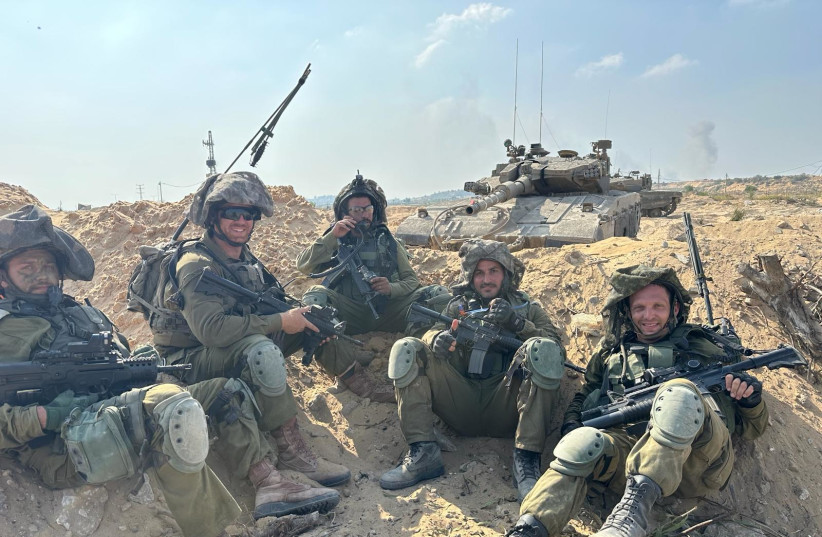For IDF Lt.-Col. Elichan, searching senior Hamas leadership’s hideaway apartment, was “another day at the office.” The 36-year-old battalion commander described the mission in which they discovered the apartment and its trap door to the Hamas tunnel system.
“We kept advancing, scanning houses,” described Elichan. “We knew that there were houses with terror infrastructure and terrorists,” he said, adding that the houses in the neighborhood that Elichan describes as “luxury” were nice and full of nice furniture, as well as stocked with ammunition, weaponry, or Hamas uniforms.
“There isn’t a house you would go into that didn’t have grenades or ammunition, or Hamas uniforms, or something about Hamas,” he said.
Elichan was part of the IDF push to take control of the Hamas leadership command center. The compound included a network of tunnels that connected hideaway apartments and offices of senior Hamas officials, the military said.
But “one tunnel was different than the others,” Elichan said, explaining how they knew they had found an apartment used by senior Hamas officials such as Hamas leader Yahya Sinwar. “The tunnel was in the basement, covered in ceramics. When we pushed on it, a trap door opened, and there was an elevator that came out of the ground and went down 20 meters to tunnels below,” he said.
IDF sits where Sinwar and Deif planned October 7 massacre
“The division commander came to see the tunnel, and I told him we should sit in a nearby apartment that was in better shape,” said Elichan. “He said, ‘This is where Sinwar and [Mohammed] Deif sat and planned the massacre,’ and that there is where he wanted to sit.

“It was a statement of values,” explained Elichan. “I want to sit here even though it is in bad condition because this is where they sat.”
Elichan’s battalion and Special Forces explored the tunnel thoroughly while they were in that area, he said. When they left, they destroyed the tunnel and its entrances.
The battalion met challenging conditions, with a large amount of enemy engagement. “In the last month, we had four or five encounters with the enemy. Some of our soldiers were hurt, and two were killed by RPG fire,” he said.
“We had another very complex encounter, with enemy engagement for over 48 hours. Whenever you encounter an enemy, you tense up. The battalion worked well, but we got used to taking fire,” its commander said.
When he isn’t on reserve duty, Elichan owns and runs a chain of pizzerias spread around the country. Pizza Story has 60 branches, only three of which closed during the war because they are located in Israel’s South. All three branches have since reopened, he said—even the branch in Sderot that was closed when it was hit by a rocket.
During the war, Pizza Story supplied pizza to soldiers in the field, which was donated both by the chain and by individuals who would drive to the shop, load up 200 pies, and bring them out to troops in the field, the restaurateur said. “I was even in the field and got delivered one of my pizzas,” he quips.
Elichan will return to reserve duty next week after two months at home. “It isn’t easy; we all tried to go back to normal, but it was hard, especially knowing we would be coming back,” he said.
“There is a mission. It is important, and we need to do it. This is our part in the big picture.”
When asked how Pizza Story would fare with him returning to reserves, Elichan didn’t sound worried. “They managed without me for three months with no preparation; they will be OK for a month and a half when they can prepare.”
